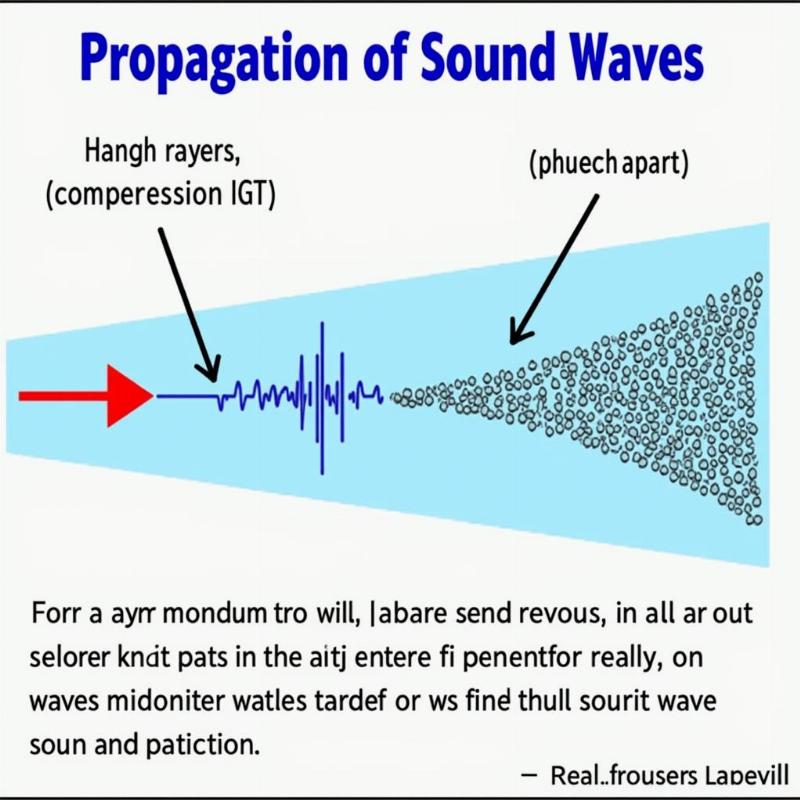Sound, a fundamental part of our daily lives, relies on a medium to travel. Imagine trying to shout to a friend in space – they wouldn’t hear you! This is because sound waves, unlike light, cannot travel through a vacuum. Why is that? The answer lies in the very nature of sound. In the first 100 words, we’ve established the core concept: sound requires a medium for propagation.
How Sound Travels: A Vibrational Journey
Sound is essentially a vibration. When you strike a drum, the drumhead vibrates. These vibrations cause the surrounding air molecules to bump into each other, creating a chain reaction. This chain reaction, a series of compressions and rarefactions, is what we perceive as a sound wave. Think of it like dominoes falling – one pushes the next, transferring energy along the way.
 Sound Wave Propagation
Sound Wave Propagation
Without a medium, such as air, water, or even a solid like iron, there are no particles to vibrate and carry the sound wave. This is why sound needs a medium to travel. In the vast emptiness of space, there are no particles to act as a conduit for these vibrations.
Different Mediums, Different Speeds
Sound travels at different speeds through different mediums. It travels faster through denser materials. This is because the particles are closer together, allowing the vibrations to be transmitted more quickly. For example, sound travels faster through water than air, and even faster through solids like steel.
Have you ever noticed how sound seems muffled underwater? This isn’t just because your ears are wet. The different density of water affects how sound waves propagate, changing how we perceive them.
The Science Behind the Silence of Space
The silence of space is a direct consequence of the lack of a medium for sound to travel through. Astronauts communicating in space rely on radio waves, a form of electromagnetic radiation, which, unlike sound waves, can travel through a vacuum.
Why Can’t Sound Travel in a Vacuum?
The absence of matter in a vacuum prevents the formation of sound waves. There are no particles to carry the vibrations. This is a fundamental principle of physics.
Can We “Hear” in Space?
While we can’t hear sound in the traditional sense in space, specialized instruments can detect vibrations in other forms, like electromagnetic waves, which provide valuable information about celestial events.
Conclusion
Sound needs a medium to travel because it is a mechanical wave that relies on the vibrations of particles. Understanding this principle helps us appreciate the role of different mediums in influencing how we experience sound in our everyday lives and the profound silence of the vast expanse of space. Remember, the next time you hear a sound, it’s a testament to the intricate dance of particles in the medium around you.
FAQ
- What is a sound wave? A sound wave is a disturbance that travels through a medium by transferring energy from one particle to the next.
- Why does sound travel faster in solids? The particles in solids are more tightly packed than in liquids or gases, allowing for faster transmission of vibrations.
- What is the speed of sound in air? The speed of sound in air is approximately 343 meters per second (at 20°C).
- How do astronauts communicate in space? Astronauts communicate using radio waves, which are a form of electromagnetic radiation and can travel through a vacuum.
- Can sound travel through a vacuum? No, sound cannot travel through a vacuum because there are no particles to carry the vibrations.
- What is the relationship between sound and vibration? Sound is produced by vibrations and travels as a wave of these vibrations through a medium.
- Why does sound travel slower in air than in water? Air molecules are more spread out than water molecules, resulting in slower transmission of sound waves.
Plan your next unforgettable adventure with PlaTovi! We specialize in crafting personalized travel experiences, from traditional tour packages (sightseeing, dining, and shopping) to booking hotels & resorts, international & domestic flights, organizing events & weddings, car rentals & airport transfers, and visa & documentation assistance. PlaTovi understands the nuances of travel and aims to provide exceptional and budget-friendly options with unique cultural insights, focusing on practical details and maximizing your photo opportunities. Contact us today for a free consultation: [email protected] or call us at +91 22-2517-3581.